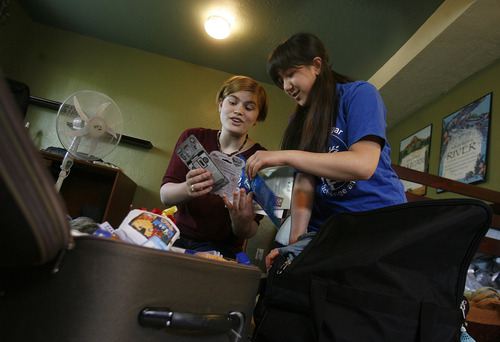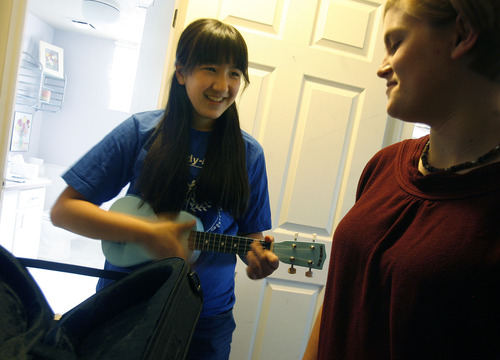This is an archived article that was published on sltrib.com in 2013, and information in the article may be outdated. It is provided only for personal research purposes and may not be reprinted.
Maryam Shehab hesitated to go onstage.
The 16-year-old had agreed to perform a pantomime scene with another student. She was to play a model and set her bag down. Her acting partner, mimicking a photographer, checked her out from a few feet away.
Back in Kuwait, girls and boys attended separate schools, adhering to a code of modesty, Shebab said recently. She called home last school year to talk it over.
"It's just acting," she recounts her mom saying. "It's not you, Maryam, it's a different person."
She placed fourth in a statewide competition for her acting during a yearlong study-abroad scholarship from the U.S. State Department.
This summer, two high-school students from Utah are heading out for such a year. They're among 65 American students to do so. Lisa Turley of Provo High School is set to spend senior year in Ghana. And Brianna Lewis of Highland High School, whose family hosted Shebab for the school year, is heading to India this month for her junior year.
"If I could convince all the world to be an exchange student, I'm pretty sure the world would be a peaceful place," said Shebab, who plans on going to dental school in the United States or the United Kingdom.
She gives credit to her theater class at Salt Lake City's Highland High for upping her confidence. After a year abroad, she said on the eve of her June flight home, she is open-minded, outgoing, stronger.
Among the high points of the year, she said, are her theater and swimming friends, but also Rice-A-Roni and Kung Pao chicken from a box.
In talking with some Utah students, she also debunked what she said is a stereotype — the idea that Kuwaiti kids "go to school on camels, they sleep in tents," she said. "And it's like, um, no, that's not how it is."
The country is more modern and "more open," she countered.
Its adherence to Islam means covering limbs, for the most part, she said. It means no drinking and no pork, she added, but also choosing whether to wear a headscarf. Most classmates, she said, were eager to learn about the religion.
Brianna Lewis, 16, takes off this month, too.
Her friends and family describe the 16-year-old as buoyant and eager to learn.
"I don't know if I've ever seen anybody with a more positive tone of voice and positive, bright eyes," said her former history teacher, Kyle Bracken.
That was especially the case when Bracken showed Bollywood film "Jodhaa Akbar" a few years ago for a lesson on 16th-century India, he said.
Now, Lewis is preparing to leave for Gurgaon, India, a city about 30 miles south of Delhi. She's interested in government and international work, she said, and hopes the year will help her pinpoint a cause to take up.
India's fast-developing cities sparked her interest, Lewis said. "While I can read some stuff in the news, it's so much more powerful to be there and experience it firsthand."
The element of discovery drew her to the vast nation, said Brianna's father, Morris Lewis. "It's just the new things and the cultures and to soak it all in."
She acknowledged some jitters about the coming year and living with a host family. "All I have is their names. I don't even know what language they're going to speak," she said.
And Lewis is part of a growing trend of high-school students electing to study abroad, said Bracken, her former history teacher. Every year, he said, about a dozen Highland students go to India as part of a spring-break humanitarian trip.
"We have a social consciousness that these kids are very attuned to," Bracken said. "It's just the idea that there's such a big world out there. And it's all there to be visited."
Brianna Lewis said she's anxious to uncover one key aspect in her coming year abroad. That component, Shebab said, is a routine part of her own days in Kuwait.
"Curry," Lewis said, or " anything spicy. I'm so excited for the food."
Twitter: @anniebknox —
International studies
R The Kennedy-Lugar YES (Youth and Exchange Study) Abroad program, sponsored by the U.S. Department of State, Bureau of Educational and Cultural Affairs, began after 9/11. It exchanges students between the U.S. and Muslim communities, mostly in Asia and Africa. It offers American high school students and recent graduates in the U.S. full scholarships for up to one academic year in countries with significant Muslim populations.





